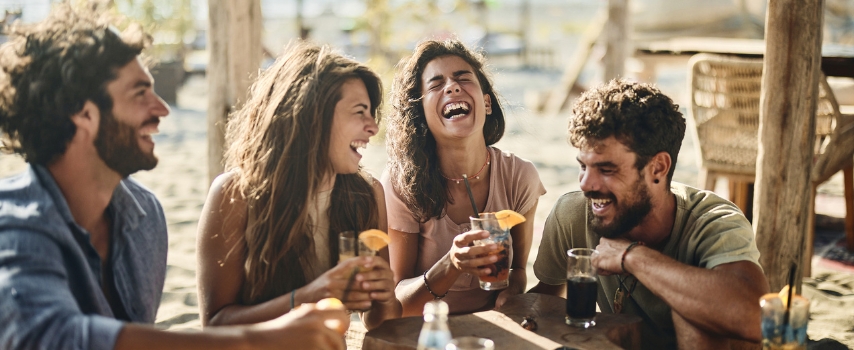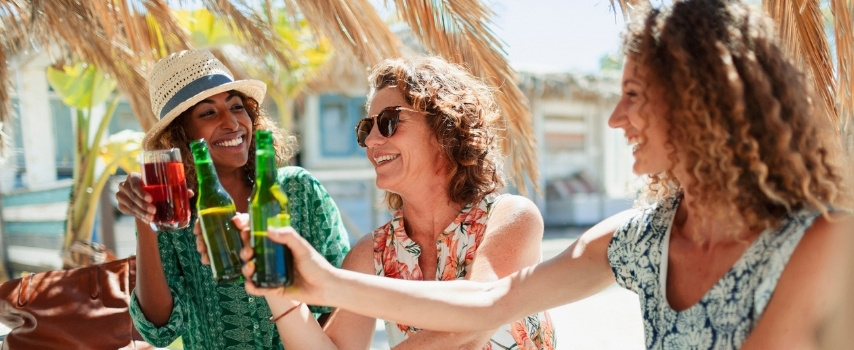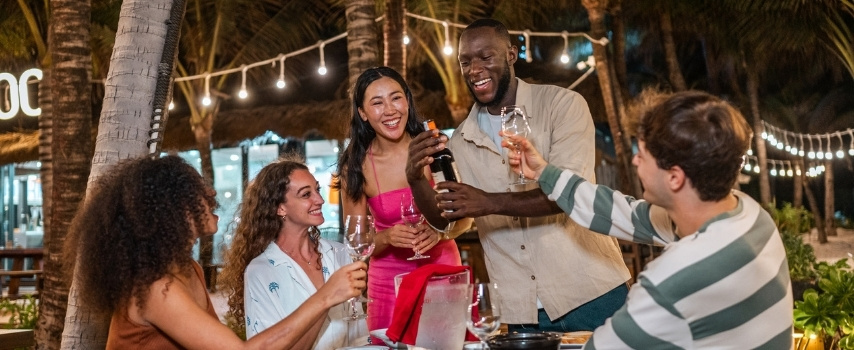What you need to know about methanol poisoning
Methanol poisoning can be fatal, so it’s smart to learn how to minimise the chance of it happening during your travels.  Source: Getty
Source: Getty
Enjoying a cocktail or a beer on holiday is totally normal. In holiday hotspots like Thailand and Bali, going to vibey bars and maybe even having a shot or two is also pretty common. We always want you to have fun on your trip – but we want you to stay safe even more. So, be smart about where you get your alcoholic drinks when you’re travelling. After all, you don’t want to end up with methanol poisoning.
'Unfortunately, alcohol production can be unregulated in some countries, which means counterfeit or illicitly produced alcohol could end up for sale – and in the hands of travellers.
'If you or your friends drink a bad batch of alcoholic drinks mixed with methanol, don’t delay getting medical help. Methanol poisoning can kill. As soon as you’re aware you’ve consumed it or symptoms start to show, call the local emergency services.
‘We’ve seen methanol poisoning cases rise in recent years, including the deaths of some unsuspecting travellers – like the recent cases in Laos.
‘So, be extra cautious if you choose to drink while travelling, drink responsibly, and only buy drinks from reputable bars and restaurants. Plus, if possible, stick to properly labelled bottled alcoholic drinks like wine or beer.’
Neil Slabbert, Cover-More's Regional Chief Medical Officer for APAC.
When it comes to travel safety, knowledge is power. So, here’s what you need to know about avoiding methanol poisoning before you set off on your next trip.
Skip ahead to learn the answers to these questions:
- What is methanol poisoning?
- How do you get methanol poisoning?
- What are the symptoms of methanol poisoning?
- How can I avoid methanol poisoning?
- What should I do if I think I have methanol poisoning?

Source: Getty
Your guide to understanding (and hopefully avoiding!) methanol poisoning
What is methanol poisoning?
Methanol is actually a widely-available chemical. It's a type of alcohol, just like ethanol.
Ethanol is the main alcohol in drinks like gin and vodka. Methanol, on the other hand, is toxic. They both look the same, but methanol has a super unique smell. You’ll find methanol in household products such as varnish, windscreen wash and antifreeze – stuff you should never drink. It’s also used to make plastics and paint, and can even be used as a biofuel for model airplanes.
Methanol might be great at helping with some household things, but it definitely isn’t for human consumption. Even drinking a tiny bit can land you in a lot of trouble: methanol poisoning can lead to blindness, coma, and, in severe cases, death.
If you think you have methanol poisoning, it's extremely important to get medical attention right away. Travelling with Cover-More cover? You can reach out to our 24/7 emergency assistance team if you need help finding a nearby medical centre – or use our app to locate one.
How do you get methanol poisoning?
Some of the most common cases of methanol poisoning are from drinking home-brewed alcohol. The methanol could’ve either been fraudulently poured into known labelled bottles (like your favourite brand of gin or vodka) or sold as locally distilled spirits. It could’ve been poured into the alcohol to make it stronger, or even left in the spirits because of poor distillation methods.
Why do some people mix this dangerous chemical with consumable alcohol? Adding methanol to drinks is a cost-saving practice that helps the sellers peddle strong alcoholic drinks for a much lower price. Imported commercial spirits can be expensive for local businesses, so homemade alcohol helps them sell drinks for a fraction of the price.
Sometimes it’s hard to spot. Methanol-laced drinks might be advertised as ‘gin’ or ‘vodka’ and sold with sugary mixers and juices to hide the taste and smell. These dangerous drinks are usually served in colourful buckets, in cocktails, or as shots, and targeted at foreign holidaymakers.
Methanol can also be found in counterfeit bottles of spirits. What might look like a brand name spirit might actually be a rip-off bottle that has the toxic chemical. Like a fake handbag, these counterfeit bottles can sometimes look exactly like the real deal.
What are the symptoms of methanol poisoning?
The initial symptoms of methanol poisoning are feeling tipsy or drunk. However, if you unknowingly drink methanol mixed with ethanol (AKA the consumable chemical in an alcoholic drink), the ethanol might protect you from methanol toxicity at first. If this happens, you might first notice you feel drowsy, unsteady, or confused.
After a while, though, the more serious symptoms of methanol poisoning might kick in, like:
- Fading in and out of consciousness
- Visual disturbance that gets worse with time
- Headaches
- Vomiting
- Abdominal pain
- Vertigo
If you don’t get treatment right away, you might notice breathlessness and hyperventilation. After this, you could have disturbances in vision, including blindness.
The long-term effects of methanol poisoning are extremely serious. Permanent vision problems, blindness, and kidney failure are all possible. In the most severe cases, coma, convulsions, respiratory issues and death may be possible.
Knowing this, it’s super important you get medical attention immediately if you think you, your travel buddy or someone near you has methanol poisoning.
If you’ve got Cover-More cover and need help, call our 24/7 emergency assistance team. We can help you find a nearby medical facility while you’re overseas. We can also liaise with the local medical staff to help you get the care you need.
How to avoid methanol poisoning
This is a tricky one, because there’s no sure-fire way to avoid methanol poisoning completely – unless you stay right away from alcoholic drinks.
To be as safe as possible, though, you could follow these seven tips:
- Never leave your drink unattended.
- Learn to recognise the signs and symptoms of methanol poisoning. Listen to your body, and get help right away if you think you have methanol poisoning.
- Do your research – only buy alcohol from places you think are reputable venues and shops.
- Avoid pre-mixed ‘bucket cocktails’ or colourful ‘ready-to-drink’ creations or shots.
- Don’t buy drinks from market stalls or informal stores.
- If the price of your drink is too good to be true, then it probably is. Imported spirits can be pricey in places like Bali and Thailand. If your drink or bottle of spirits is much cheaper than what you would pay at home, it is most likely a homebrew, and it’s probably best to stay right away from drinking it.
- If you buy bottle drinks, check the seals are intact, and the label is free from spelling errors or poor labelling.

Source: Getty
What to do if you suspect methanol poisoning
If you think you or someone you know has methanol poisoning, get medical help immediately.
The sooner the poisoning is treated by medical professionals, the better the outcome. Medical professionals can often treat methanol poisoning by administering ethanol, along with other complex therapies. So, it’s super important to get help as quickly as you can.
Heading overseas soon?
Get a quote to check out what we can cover and how we can help if things go pear-shaped during your trip
Sources:
Material on this website is provided for informational purposes only. It is general information and discussion about medicine, health and related subjects may not apply to you as an individual, and is not a substitute for your own doctor’s medical care or advice. The words and other content provided on this website, and in any linked materials, are not intended and should not be construed as medical advice. If the reader or any other person has a medical concern, they should consult with an appropriately licensed physician or other health care worker. Nothing contained on the website is intended to establish a physician-patient relationship, to replace the services of a trained physician or health care professional, or otherwise to be a substitute for professional medical advice, diagnosis, or treatment. The views and opinions expressed on this website have no relation to those of any academic, hospital, practice or other institution with which the authors are affiliated. They do not necessarily reflect the opinions of Cover-More Insurance Services Pty Ltd. Never disregard medical advice or delay seeking medical care because of something you have read on or accessed through this website. If you think you may have a medical emergency, call your doctor or emergency services immediately.